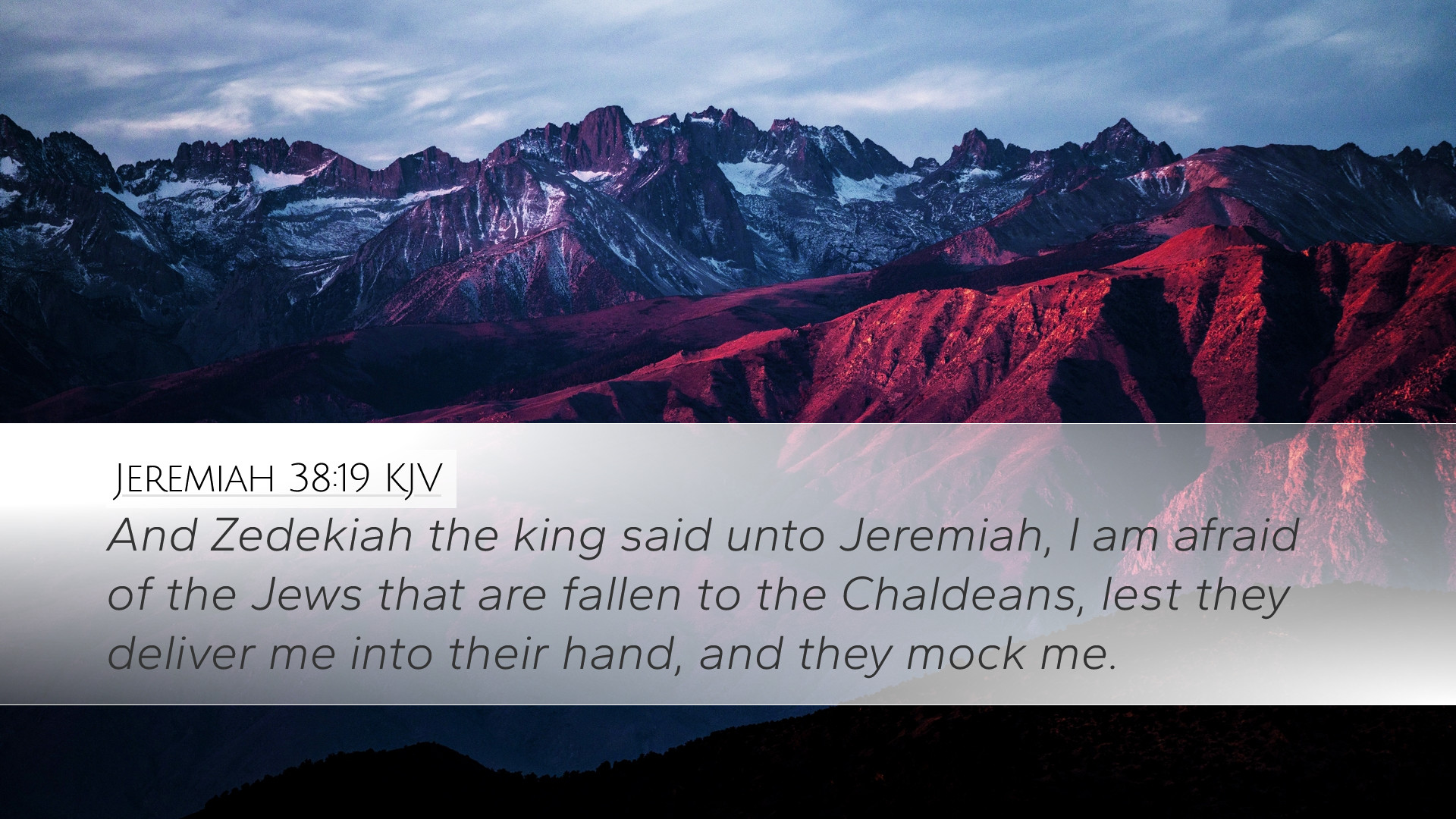Bible Commentary on Jeremiah 38:19
Verse: “And Zedekiah the king said unto Jeremiah, ‘I am afraid of the Jews that are fallen to the Chaldeans, lest they deliver me into their hand, and they mock me.’” (Jeremiah 38:19)
Contextual Background
This verse is set in a tumultuous period in Judah's history, just before the fall of Jerusalem to the Babylonians. King Zedekiah, the last king of Judah, is in a precarious position as the siege intensifies. The environment is charged with fear and uncertainty, not only for the Israelites but particularly for their king, who is caught between his allegiance to God’s prophet, Jeremiah, and the pressures from his own people.
Commentary Insights
General Observations
In this brief dialogue, we observe Zedekiah's fears about murmurs among the people and the consequences of his decisions. His statement to Jeremiah reveals the internal conflict he is experiencing—caught between divine revelation and political realities.
Matthew Henry's Insight
Matthew Henry comments that Zedekiah’s fear reflects a fragile heart unable to trust in God amid imminent danger. Henry points out that instead of seeking God’s counsel through prophetic guidance, Zedekiah was more concerned with the opinions of the disaffected Jews who had deserted to the Babylonians. This illustrates a deeper spiritual issue; a lack of faith leads to insecurity and an inability to act courageously in times of adversity.
Albert Barnes’ Perspective
Albert Barnes emphasizes the king's recognition of his cowardice contrasted with the spiritual duty expected from a leader. Zedekiah feared mockery from other Jews as he was already facing scorn from the Chaldeans. Barnes points out that this fear was irrational—as the situation continued to deteriorate, the mockery of the Jews would be the least of his concerns. The ridicule he feared is a manifestation of his existing weakness—he is portrayed as more a puppet than a king who leads with strength of spirit.
Adam Clarke's Commentary
Adam Clarke provides a linguistic perspective on the phrase “I am afraid of the Jews that are fallen to the Chaldeans.” Clarke notes that there was no real reason for Zedekiah to fear the Jews who had defected since they sought peace and safety under Babylon's rule. Clarke draws attention to the folly of Zedekiah's reliance on public opinion instead of divine revelation. His fear not only hinders his decision-making but exposes a gap in his understanding of God's sovereignty over the situation.
Theological Implications
The verse invites theological reflection on the nature of governance amidst crisis. Zedekiah’s example serves as a cautionary tale about the pitfalls of leadership that is primarily driven by fear of man rather than faith in God. This has profound implications for contemporary leaders, who must navigate the delicate balance between public opinion and spiritual responsibility.
The Fear of Man
Proverbs 29:25 states, “The fear of man brings a snare, but whoever trusts in the Lord shall be safe.” Zedekiah’s fear illustrates the spiritual bondage that arises when leaders prioritize human respect over divine command.
Idolatry of Public Opinion
In the ministry, there is a tendency to yield to popular sentiment rather than holding firm to the truth of Scripture. This passage exemplifies how such compromises can lead to dire consequences. It challenges ministers and church leaders to depend on God’s wisdom and to seek His guidance amidst societal pressures.
Practical Applications
- Encourage boldness in faith: Leaders should prioritize God's direction in their ministry decisions, trusting that He equips them for challenges.
- Seek counsel from the wise: Engage with spiritually mature individuals who can provide godly advice, rather than succumbing to popular opinion.
- Preach against the fear of man: Address the anxieties that accompany leadership in a fallen world, encouraging congregations to look to God as their safe haven.
Conclusion
Jeremiah 38:19 encapsulates the desperation and compromised leadership of Zedekiah during a tumultuous time. Reflecting upon this verse deepens our understanding of the challenges faced by leaders, particularly in faith contexts. The insights drawn from public domain commentaries remind us that while fear is a natural human emotion, it should never define our actions as we lead with integrity, wisdom, and a steadfast trust in God.


